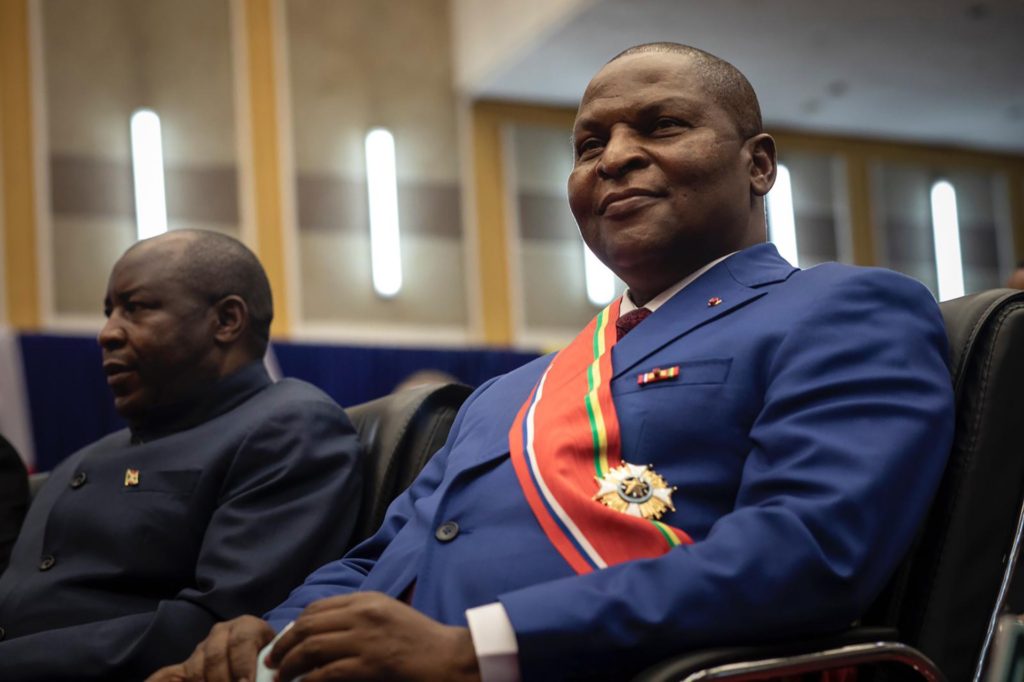A Russian paramilitary group called COSI said in a Sunday post on the messaging platform Telegram that hundreds of “experienced” Wagner Group mercenaries are pouring into the Central African Republic (CAR) to “ensure security” ahead of a July 30 referendum that could give President Faustin-Archange Touadera a third term in office.
“Another aircraft has arrived in Bangui with instructors to work in the Central African Republic. The scheduled rotation continues. Several hundred experienced professionals from the Wagner company are joining the team working in the CAR,” the statement from COSI claimed.

Central Africa Republic President Faustin-Archange Touadéra sits during his inaugural ceremony in Bangui on March 30, 2021. (AP Photo/Adrienne Surprenant)
“Russian instructors will continue to help soldiers from the Central African armed forces and CAR law enforcement agencies provide security, in anticipation of the constitutional referendum scheduled for July 30,” the statement said.
The Telegram post was accompanied by a photo showing dozens of masked troops standing on an airport runway, presumably after arriving in the CAR by plane, although no further details were offered by the authors.
The Wagner Group is the infamous mercenary organization cofounded by erratic Russian billionaire Yevgeny Prigozhin. Wagner has several lucrative contracts to provide security for African nations and valuable assets within them, such as gold mines.
The Wagner Group has often been seen as a deniable black-operations wing of Russian leader Vladimir Putin’s military, having been involved in such dubious adventures as the annexation of Crimea and a disastrous attempt to dislodge American and Kurdish forces from a Syrian town in 2018.
Hundreds of Wagner fighters arrive in Central Africa: Russian security group https://t.co/mqYmEa6gJQ
— africanews 😷 (@africanews) July 17, 2023
Wagner and Prigozhin seemingly turned against Putin in June, launching a short-lived mutiny that brought the rebellious mercenary company surprisingly close to Moscow. Prigozhin and some of his troops were supposedly offered sanctuary in Belarus by its dictator, Alexander Lukashenko, but Prigozhin’s status and current whereabouts are the subject of much speculation. Lukashenko recently claimed the Wagner boss never left Russia, and there are reasons to believe him.
The fate of the Wagner Group is also uncertain. Prigozhin ostensibly launched his mutiny because Russian Defense Minister Sergey Shoigu wanted to conscript all of Wagner’s men into the Russian military, effectively dissolving the organization. Prigozhin claimed Shoigu also tried to dissolve some of his mercenaries with missile strikes.
Observers pointed out that Wagner is simply too valuable for Putin to eliminate, thanks to security contracts like the one it has with the CAR. Humanitarian groups and the United Nations have accused Wagner of massive human rights violations in the CAR, including teaching government troops how to torture captives, using rape as a weapon against civilians, and wiping out entire villages.
The CAR has extensive gold, diamond, and timber resources that President Touadera tapped to hire the feared Russian mercenaries. In late June, the U.S. Treasury Department announced sanctions against companies linked to the Wagner Group for “exploiting natural resources” in the CAR and Mali — in other words, for nakedly plundering the CAR’s gold mines.

Gold miners in Ndassima gold mine, 40 Km of Bambari, in Seleka group controlled zone, in the Eastern part of CAR. (Thierry Bresilion/Anadolu Agency/Getty Images)
Touadera was elected to the presidency in 2016. In 2018, the first Russian security contractors arrived in the CAR, working as both instructors and front-line soldiers fighting against rebel groups. Wagner troops have frequently been seen serving in Touadera’s personal security detail.
In early July, foreign observers noted hundreds of Wagner fighters pulling out of the CAR by plane, prompting speculation that the mercenary company would withdraw from the CAR entirely in the wake of Prigozhin’s mutiny. The Touadera government denied these reports and said the Wagner troops were merely undergoing a planned “rotation.”
If the COSI account is correct, the Wagner Group is coming back in force to provide “security” for the July 30 referendum called by Touadera in a bid to extend his power. The referendum would remove the two-term constitutional limit on the presidency, allowing Touadera to run for a third term in 2025. Opposition groups have strongly protested against removing the presidential term limit.
Wagner mercenaries arrive in CAR as president tries to extend his term. https://t.co/MpAARXAx1Q
— Stewart Bell (@StewGlobal) July 17, 2023
“There won’t be a third term, but the count will be set back to zero, so anyone can seek a new term, including Touadera if he wants,” Touadera adviser Fidele Gouandjika told AFP after the referendum was announced at the end of May, an amusing bit of sophistry that does not appear to have mollified anyone opposed to Touadera remaining in office.
According to U.S. intelligence, COSI (the “Officer’s Union for International Security”) is a front for the Wagner Group. COSI purportedly oversees Russian private military contractors in Africa, so either way, it probably knows if Wagner troops are deploying to the CAR in force.
The Financial Times (FT) on Tuesday described Wagner’s return to the CAR as a crucial test of the organization’s “muscle” after the failed Prigozhin mutiny — and possibly Touadera’s best bet to remain in power, since he would almost certainly have been bumped off by the rebels in 2018 without Wagner’s brutal intervention.
“The rebel coalition remains very fragmented but they might take advantage of the security vacuum left by Wagner to take back control of some areas,” Crisis Group director for Central Africa Enrica Picco told the FT.
Fidele Gouandjika insisted the Kremlin has “reassured” Touadera that he will be protected by Russian mercenaries, whether they are employed by Wagner or otherwise. Some analysts told FT the Wagner withdrawal at the beginning of July might have been a negotiating tactic to intimidate Touadera into paying more for the company’s services.


